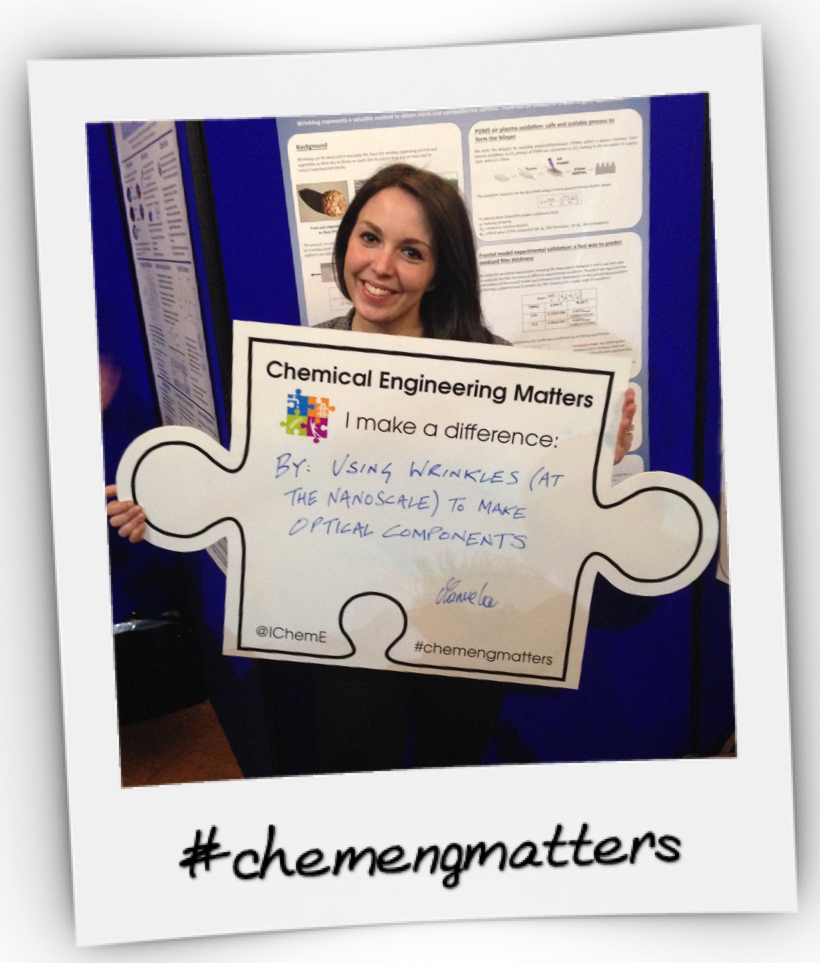Ten things to do after graduation
22nd July 2016

This week's heatwave has reminded us all in the UK that summer is finally here, and for many students this means one thing - final projects have been handed in, last exams have been sat, and the ceremonial end to University is in sight - graduation.
If you are a final year chemical engineering student you may have already had your graduation, if not it's just around the corner. This is a time to celebrate all your hard work and thank those who have helped you make it this far.
It may be the end of an era, but don't panic about what comes next. You are about to begin your journey to become a professional chemical engineer.
But where to start? Here's our ten top things to do after graduation:
1. Get yourself organised

Sadly you are leaving your University life behind, but in your time studying you also learnt some important life skills. You have made your student house your home, paid bills registered every card, account, profile and mobile phone there.
Take time after University to update your details. Remove your student address from things like your bank account, and don't forget to update your email address. Often when registering for things as a student it's easier to use your University email but once you leave that account will close.
If you are a student member of IChemE you will also need to update your details with us. Do that by visiting MyIChemE.
2. Consider your options

You should know by now that a chemical engineering degree can take you down a number of different paths, and it's important you choose the route that is right for you.
Perhaps you really enjoyed the research and academic side of University? Often students choose to continue studying, completing a Masters or continuing on to do a PhD or EngD. Find out more about your eligibility for postgraduate study with our postgraduate guide.
If you want to go into industry then the options are endless. Think about the kind of work you would like to do - is it in water, energy, pharmaceuticals, food, processes, products, fast-moving consumer goods? What other priorities do you have? Is it good benefits, an opportunity to travel or job security?
Our Salary Survey provides an in-depth analysis of the state-of-play for chemical engineers in a variety of different sectors.
3. Update your CV

Now that you have graduated your CV should reflect you as an engineer, and not as a student. Make sure the title of your degree, university and grade is in a prominent space (this is something to be proud of!) and make sure you include all of your engineering work experience.
It should be no surprise that employers are impressed by work experience. If you haven't had any make sure you highlight the experience you got while studying, and it may be worth applying for placements before looking for permanent jobs.
You can find out more about placements here.
If your CV is still looking a little thin on the ground then try to think of other experiences and interests that show desirable skills of an engineer. If you were captain of a sports team for example, you can demonstrate leadership, commitment, and team-work. If you worked in a bar you have an ability to work under pressure, good communication skills and can multi-task.
4. Build your network

Your network of professionals will be hugely important throughout your career. Make sure you stay in touch with your contemporaries and university professors - you never know when or where you might meet them again. Ask your professors if they are happy to provide an academic reference for you before putting them on your CV - it's just good manners!
Part of your IChemE membership includes being part of your regional member group and, if you wish, a special interest group. These groups are a great place to find like-minded engineers to talk to and ask for career advice.
Social media is also a great place to grow your contacts. LinkedIn is the most favourable for professional networking, so the IChemE LinkedIn group is a good place to start. You can start discussions, join in on hot topics, and ask for tips from a network of experienced engineers.
5. Where do you want to be?

Chemical engineers are making a difference every day. They are providing the world with energy security, sustainable food, efficient medicines, clean water, quality consumer goods, and much, much more. This is your time to decide where you want to make a difference!
If you are interested in academia route then consider where you want to study, and where you might see yourself teaching. A career in academia starts out focused at a particular University, so choose somewhere that has the right atmosphere, the right facilities, and the peers that you want to learn from.
If industry is where you are heading then avoid sending out mass emails to every engineering company going. You need to really consider where your skills lie and how you would like to make a difference.
Be aware that once you learn your trade in a particular sector it can be difficult to go elsewhere, so we advocate keeping your options open while you decide. To quote the advice of one of our members Sean Moran; "It is frequently much easier to change company or even country than it is to change specialism." In short, try to pick something you can still see yourself doing in twenty years time.
6. Help from the experts

We think everyone should know exactly what chemical engineering is, but in reality recruitment is a vast and most recruiters have a limit in terms of their expertise and understanding.
For the best chemical engineering opportunities go to a recruiter that has strong links with engineering companies, and will understand the type of role you're looking for. IChemE's global recruitment partner is NES Global Talent, a fantastic recruitment company that are specialists in engineering jobs.
Remember you can also check out The Chemical Engineer jobs board for our pick of the top chemical engineering roles.
7. Show your passion for engineering

If you really want to be a chemical engineer then that should shine through - on your CV, but most importantly through your cover letter. A cover letter is an employers insight into you as a person, so try to make it as personal as you can and relate your skills back to the company's ethos and values. Don't copy and paste a generic letter to every company - employers aren't stupid.
Social media is used more and more by employers to find out about potential candidates, so don't do yourself a disservice before you even start. Clean up your profiles on Facebook, LinkedIn, Twitter, Instagram etc, use correct language, a professional tone and update your privacy settings. And make sure all those photographs you wouldn't want your employer to see are private.
8. Change your membership grade

Your IChemE membership is a valuable part of being a professional chemical engineer. It can help your career progress and after graduation the benefits you receive are even better. You should apply online after graduation to upgrade your membership, and based on your degree you will become an Associate (AMIChemE) or Affiliate member.
As well as access to a variety of free resources to improve your skills and knowledge such as The Chemical Engineer, free journal articles, equations, and books via Knovel, and exclusive discounts, you will also have access to a network of over 44,000 IChemE members in over 120 countries.
We also offer a discounted rate for postgraduate students, email members@icheme.org to find out how much you could save.
9. Continue to develop your knowledge and skills

Continued Professional Development (CPD) is an important part of maintaining your prestige as a professional chemical engineer, and as a membership organisation we actively support this.
Lots of things count towards CPD, some that you might not expect so make sure you read the guidelines! CPD can be; work-based learning, reading relevant publications, private study, training courses, workshops, attending seminars, attending conferences, taking part in discussion groups, webinars, delivering lectures or talks, relevant voluntary work and being actively involved with IChemE.
IChemE members can record all their CPD activity using our mycareerpath tool. As well as space to plan and record achievements, the tool also encourages you to reflect on your development so far.
You can find out about IChemE's upcoming courses by downloading the 2016 Training Catalogue here.
10. Prepare to get Chartered

Getting Chartered is one of the best things you can do to advance your career as a chemical engineer. It is the gold standard for our profession, and recognised all over the world. To achieve Chartered status there are a number of requirements, some based on professional experience that you won't have had straight out of University.
Getting Chartered can be a long process, so preparation and starting early is key. Start using mycareerpath from the outset, as this will be an essential part of your 'Competence and Commitment Report;' evidence of your professional development.
As you are starting out it's always good to feel supported. IChemE provides its own support through presentations, webinars and guidance documents designed to provide you with helpful information on the process, find out more here.
You can also apply to have a mentor, an IChemE Chartered Member or Fellow who will help you through the process with regular meetings and guidance. Learn more about mentors here.

But most importantly make sure you take the time to reflect on and celebrate your achievement. Getting a degree in chemical engineering involves a lot of hard work and you should be proud of your success.
Congratulations to all of you who are graduating!
Did you find this advice useful? Visit OnCampus for even more useful tips and resources for students.
Still unsure where to go next? Engineering in Society is a free e-book from the Royal Academy of Engineering, providing a detailed insight of the career options available to engineers. Download it for free here.
If you're a chemical engineering student and are interested in writing your own blog post about your experience, please get in touch.